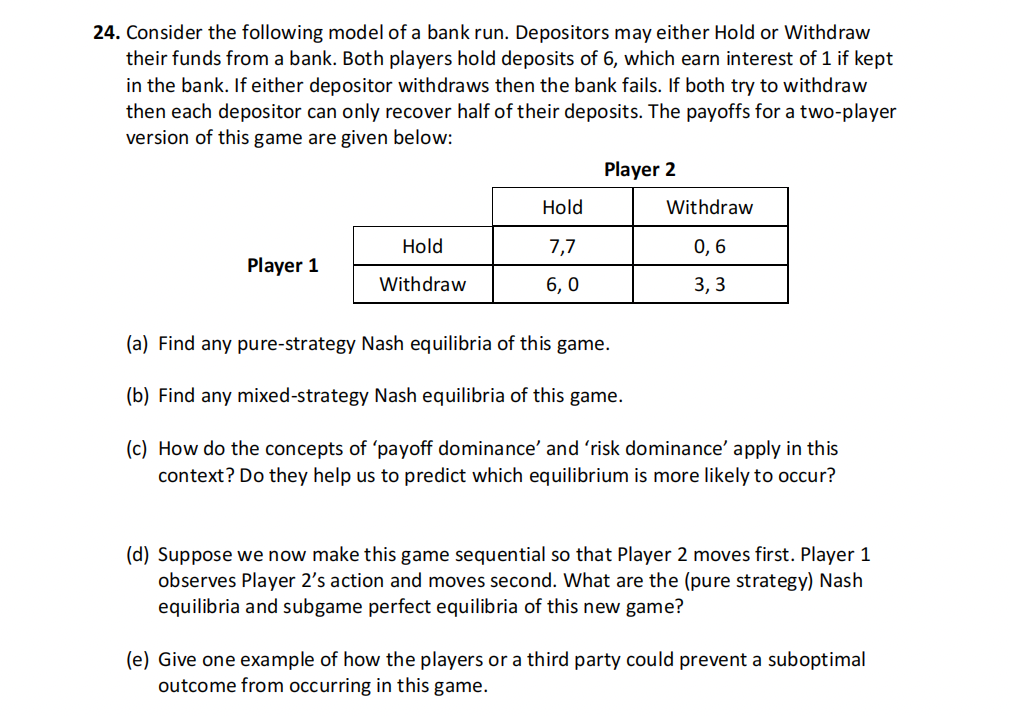24. Consider the following model of a bank run. Depositors may either Hold or Withdraw their funds from a bank. Both players hold deposits of 6, which earn interest of 1 if kept in the bank. If either depositor withdraws then the bank fails. If both try to withdraw then each depositor can only recover half of their deposits. The payoffs for a two-player version of this game are given below: Player 2 Player 1 Hold Withdraw Hold 7,7 6,0 (a) Find any pure-strategy Nash equilibria of this game. (b) Find any mixed-strategy Nash equilibria of this game. Withdraw 0,6 3,3
24. Consider the following model of a bank run. Depositors may either Hold or Withdraw their funds from a bank. Both players hold deposits of 6, which earn interest of 1 if kept in the bank. If either depositor withdraws then the bank fails. If both try to withdraw then each depositor can only recover half of their deposits. The payoffs for a two-player version of this game are given below: Player 2 Player 1 Hold Withdraw Hold 7,7 6,0 (a) Find any pure-strategy Nash equilibria of this game. (b) Find any mixed-strategy Nash equilibria of this game. Withdraw 0,6 3,3
Chapter8: Game Theory
Section: Chapter Questions
Problem 8.8P
Related questions
Question

Transcribed Image Text:24. Consider the following model of a bank run. Depositors may either Hold or Withdraw
their funds from a bank. Both players hold deposits of 6, which earn interest of 1 if kept
in the bank. If either depositor withdraws then the bank fails. If both try to withdraw
then each depositor can only recover half of their deposits. The payoffs for a two-player
version of this game are given below:
Player 1
Hold
Withdraw
Hold
7,7
6,0
Player 2
Withdraw
0, 6
3,3
(a) Find any pure-strategy Nash equilibria of this game.
(b) Find any mixed-strategy Nash equilibria of this game.
(c) How do the concepts of 'payoff dominance' and 'risk dominance' apply in this
context? Do they help us to predict which equilibrium is more likely to occur?
(d) Suppose we now make this game sequential so that Player 2 moves first. Player 1
observes Player 2's action and moves second. What are the (pure strategy) Nash
equilibria and subgame perfect equilibria of this new game?
(e) Give one example of how the players or a third party could prevent a suboptimal
outcome from occurring in this game.
Expert Solution
This question has been solved!
Explore an expertly crafted, step-by-step solution for a thorough understanding of key concepts.
This is a popular solution!
Trending now
This is a popular solution!
Step by step
Solved in 5 steps with 1 images

Knowledge Booster
Learn more about
Need a deep-dive on the concept behind this application? Look no further. Learn more about this topic, economics and related others by exploring similar questions and additional content below.Recommended textbooks for you


Principles of Economics 2e
Economics
ISBN:
9781947172364
Author:
Steven A. Greenlaw; David Shapiro
Publisher:
OpenStax

Brief Principles of Macroeconomics (MindTap Cours…
Economics
ISBN:
9781337091985
Author:
N. Gregory Mankiw
Publisher:
Cengage Learning


Principles of Economics 2e
Economics
ISBN:
9781947172364
Author:
Steven A. Greenlaw; David Shapiro
Publisher:
OpenStax

Brief Principles of Macroeconomics (MindTap Cours…
Economics
ISBN:
9781337091985
Author:
N. Gregory Mankiw
Publisher:
Cengage Learning

Essentials of Economics (MindTap Course List)
Economics
ISBN:
9781337091992
Author:
N. Gregory Mankiw
Publisher:
Cengage Learning

Managerial Economics: Applications, Strategies an…
Economics
ISBN:
9781305506381
Author:
James R. McGuigan, R. Charles Moyer, Frederick H.deB. Harris
Publisher:
Cengage Learning